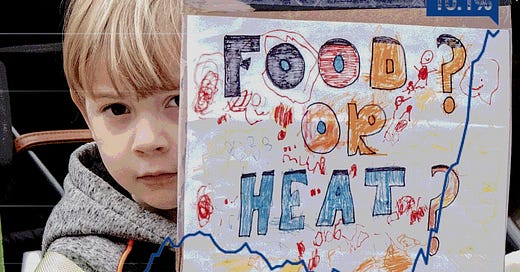Inflation Profiteers: How Corporations Are Making Millions Price Gouging Consumers
The reality of the 'cost of living crisis' is that as consumers are made poorer, major corporations are making record profits, reports Matt Bernardini
Inflation is hitting people hard. Central banks in both the US and the UK have raised interest rates to recent historical highs as rampant price rises throw millions into poverty. However, while some of these rises are due to global factors like the pandemic and the war in Ukraine, few people are talking about the fact that much of what we’re seeing is due to a much more pernicious cause.
In reality, as poverty grows, a small number of large corporations are increasingly using their dominant position to price gouge consumers right across the world.
There is no doubt that prices are rising fast. In November, the inflation rate in the US reached 7.1% while UK consumers had to deal with a rate of 10.7%, the highest in 40 years. Federal Reserve Chairman Jerome Powell responded by aggressively raising interest rates, while the Bank of England raised UK interest rates to their highest level in 14 years.
However, while historically such large rate rises have occured when prosperous economies were overheating, this time, as the economist Robert Reich has noted, they are taking place as real-terms wages are actually shrinking.
And as consumers get poorer, corporate profit margins have reached their highest levels since 1950. Since the 1980s, two-thirds of all American industries have become concentrated in fewer hands, meaning consumers increasingly have little choice but to pay what is demanded of them.
This perfect storm of corporate dominance has allowed corporations to jack up their prices to record levels. But don’t take my word for it, take theirs.
Groundwork Collaborative, an activist group that focuses on economic issues, obtained transcripts from hundreds of earnings calls where many corporate executives bragged about their price increases.
“I think we’ve done a great job with our pricing”, boasted the CFO of Hormel, a maker of popular grocery brands. “I think it’s been very effective”.
Kraft Heinz's chief financial officer predicted that the company's margins would increase because "as we continue to price [for] inflation, the inflation events that start to ease, that might put us in a better position for us to continue to recover the margin”.
The strategy has been very effective for food companies like Hormel and Kraft. In the US food prices have been 10% higher in 2022, while in the UK the price of budget food items has increased by a whopping 17%.
And it’s not just the grocery industry where executives have taken advantage of consumers.
The CEO of PPG, a Fortune 500 paint corporation, was asked if the company would lower prices as the cost of raw materials declines. He responded, “we’re not going to be giving this pricing back”.
Fortunately, some important policymakers are starting to take notice and have begun documenting this corporate greed.
The US House Subcommittee on Economic and Consumer Policy released a report last month detailing how corporations have raked in record profits while raising prices to excessive levels.
From 2019 until 2021, three of the five largest companies in the shipping industry saw profits rise by 29,965% and four of the largest public companies in the meat processing industry saw profits go up by 134%.
The report notes that this was not a coincidence. The CEO of Tyson Foods said on an earnings call that: “Our pricing actions and strength in the beef segment … more than offset the higher [costs of goods and services]”.
Dr. Rakeen Mabud, chief economist at Groundwork Collaborative, told the Committee that this kind of price gouging is possible because many consumers don’t understand the intricacies.
“When prices go up generally, companies are able to raise prices without the consumers understanding how much of that price increase is coming from factors that are happening in the economy and how much of that price increase is coming from [the corporations] just gilding the lily”, Mabud said.
The story has been the same in the UK. According to a study by the Unite union, profit margins for the country’s biggest companies were 73% higher than pre-pandemic levels in 2019. Even excluding energy firms, company profits increased by 42% during the same period.
“The UK appears to be following the pattern of inflation profiteering noted in the US, albeit some months behind the curve”, the report found.
Progressive parties in both countries would be wise to start focusing on these issues. An excess profits tax would be a good place to start. This would be a tax imposed on company profits above a certain rate, which would diminish the incentive to price gouge. With a fresh Senate beginning next month, Democrats should consider the windfall profit tax legislation that Bernie Sanders introduced back in March.
In the short-term it’s likely that consumers will be squeezed even more. Energy bills in the UK and US are forecast to hit record highs heading into the winter.
Voters are noticing. And unless legislation is passed to address this crisis of price gouging, those refusing to take it on will pay a large political price.




